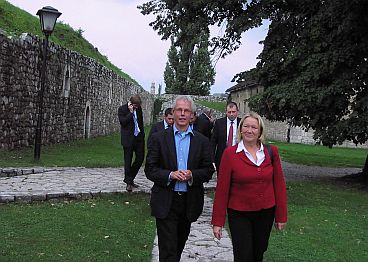Council of Europe: grave concerns over Bosnia-Herzegovina
Council of Europe: grave concerns over Bosnia-Herzegovina
On 3rd October, fifteen years after the end of the Bosnian war (1992 – 1995), the inhabitants of Bosnia and Herzegovina will go to the polls to elect a new national parliament, two state parliaments and presidents of both the country as a whole and its constituent states. 'More than half of the voters are threatening to stay away,' says SP Senator Tiny Kox, who is leading the Council of Europe's team of election observers. 'Fifteen years after horrors such as occurred in Srebrenica, confidence in the future is minimal.' Kox has spent the last week visiting the country and speaking with a large number of those involved in the forthcoming elections.

The delegation of the Council of Europe in Banja Luka
The Bosnian war cost more than 100,000 lives and devastated the country. Fifteen years on the traces of that war are still to be seen everywhere. The country is strewn with graveyards, bullet holes are visible everywhere and little has been done to heal social divisions. As Kox explains, 'The country is divided into two federal states, the Serbian Republic and the Bosnian-Croatian Federation, which have little to bind them. The political parties in the former want to be as free as possible from the central government and the national parliament in Sarajevo. In the latter they want precisely the opposite, a more centralised and unitary form of state.'
Recognition of Kosovo as an independent country by most western powers, including the Netherlands, seems to have given nationalism in the Serbian Republic a powerful shot in the arm, in Kox's view. "Politicians in the Serbian section of the country speculate, sometimes openly, about secession and don't, in any event, want to see any of the powers reserved to the republic handed over to the central power. The political parties in the other section, the Bosnian-Croatian Federation, demand the opposite. Because of this nothing can be resolved in relation to a badly-needed revision of the Constitution, a revision required by the Council of Europe, as was recently confirmed by the European Court of Human Rights. This is to the cost of the country's governability, at a time when there is so much which needs to be done to improve the lot of its people. A quarter of the population lives below the poverty line, and another quarter only just above it."
During a closing press conference in Sarajevo, the SP Senator made a number of observations, both positive and negative. "So far the campaign has proceeded peacefully. Most of those involved think that the elections themselves will be reasonably free and fair. There is a great deal of faith in the national electoral council and in the international observers. Less positive is the fact that the political tone is more one of confrontation than cooperation. In addition, there are doubts regarding the free access of all parties to the media. There is a lack of transparency over how political parties are financing their campaigns. And there's a fear that when the votes are counted fraudulent practices will be easy to perpetrate." In his role as delegation leader, Senator Kox issued an urgent call to all parties to give due account to the importance of the elections and to the absolute necessity in their aftermath of working to achieve constitutional reforms and social progress.
The Council of Europe observers will return to Bosnia at the end of the month to witness the elections, which take place on 3rd October.
